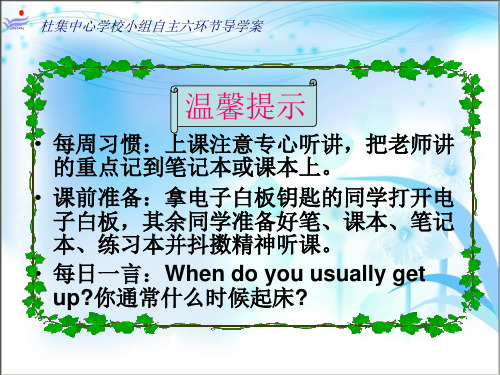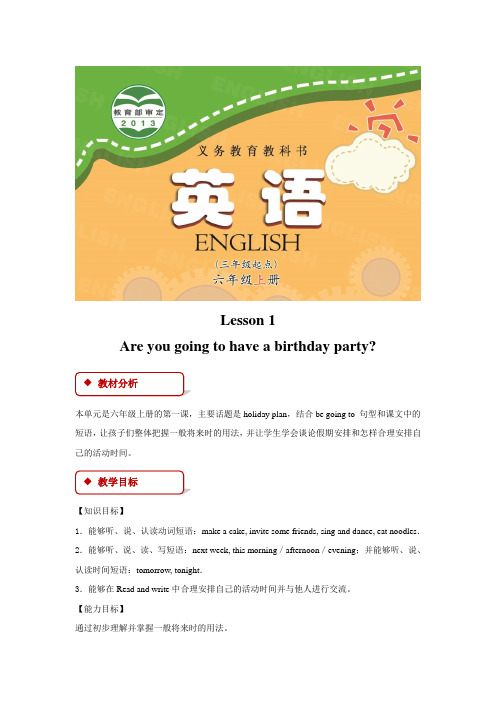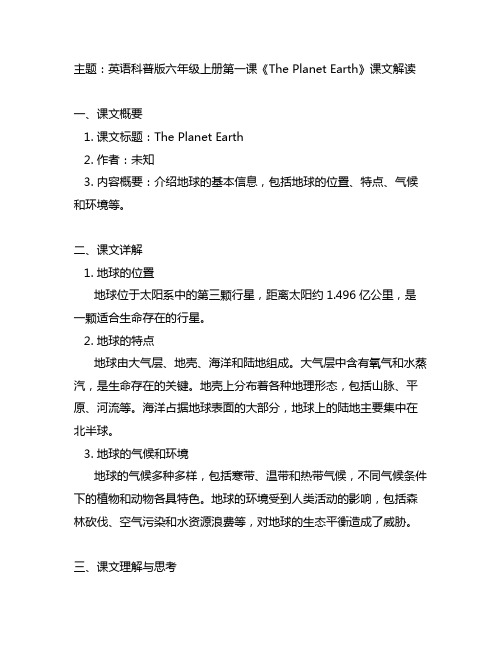最新科普版六年级英语上册第1课说课材料
科普部六年级上册英语第一课第一课时Let's talk

杜集中心学校小组自主六环节导学案
轻松演练
• Do you have lunch _____ eleven? • A. on B. at C. for D. to • I always have lunch at twelve.(改为一般
疑问句) • 【真题回放】 • Do you always have lunch at twelve?(根
杜集中心学校小组自主六环节导学案
快乐自学
What time is it?=What’s the time? 现在几点钟? It’s time for lunch=It’s time to have lunch.到吃午饭的时 间了。 It’s time for +名词=It’s time to +动词原形…到…… 的时间了 It’s time for…到……的时间了。 如:It’s time for class。到上课的时间了。
杜集中心学校小组自主六环节导学案
快乐自学
• 主语是第一人称I,We 的一般现在时的疑问句式 要借助助动词do的方式来构成。
• Do 放句首 •I
• we you
• 结构为: • Do + you+其它成分? • 主语I,we变一般,句首要把Do来安,人称改变
莫要烦,I、we定要变成you,句末问号莫要溜。
杜集中心学校小组自主六环节导学案
轻松演练
• 按要求写句子
• 1.What time is it?(改为同义句)
• 2.It’s time for lunch.(改为同义句)
• 单项选择
• It’s twelve. It’s time____lunch.
• A.to
B.with
科普版-英语-六年级上册-Lesson 1 Do you always have lunch at twelve教学教案

(Main and Difficult
Point)
1.运用新单词就本课句型进行替换练习.
2.通过音标认读新单词.
3.培养学生语感,提高学习兴趣.
教学准备(Teaching Aids)
录音机 多媒体 单词卡片
Period
First period
基本教学过程(参考)
(Teaching Procedure)
小学英语六年级第七册英语教案
Lesson 1 Do you always have lunch at twelve?
教学内容(Teaching Material)
Book seven
Lesson 1 Do you always have lunch at twelve?
设计人(Designer)
Shiyan xiaoxue Shi Yongqin
(学生再次了解课文)
3.Reading and comprehension
a. If you want to understand it well enough,you must read it by yourself
(进一步了解课文,同时训练学生的阅读能力)
b. Reading the quedtions at first then read the text again, then answer the questions.
2.Show the topic
OK,today we will learn lesson one: Do youalwayshave lunch at twelve?
(Write the topic on the blackboard,以旧引新,循序渐进的导入,减低学习难度)
科普般六年级英语上册第一课时Let's talk

温馨提示
• 每周习惯:上课注意专心听讲,把老师讲 的重点记到笔记本或课本上。 • 课前准备:拿电子白板钥匙的同学打开电 子白板,其余同学准备好笔、课本、笔记 本、练习本并抖擞精神听课。 • 每日一言:When do you usually get up?你通常什么时候起床?
• 在工作日 on weekdays • weekend 周末 :周六,周日。 • Saturday and Sunday
杜集中心学校小组自主六环节导学案
快乐自学
Ask and answer
• • • • Where are you from? I’m from Xinjiang. What time do you usually get up in Xinjiang? I usually get up at nine.
• get up起床 • only仅仅 • weekday 工作日 也就是从星期一到星 期五。即 from Monday to Friday. • on weekdays 在工作日 • I only get up early on weekdays. • =I only get up early from Monday to Friday.
连词成句。 ① do you when usually go home When do you usually go home? _________________
② gets up early every day Xiaogang
Xiaogang gets up early every day . __________________ ③are so you early You are so early.
【教学设计】Lesson 1(科普)

Lesson 1Are you going to have a birthday party?本单元是六年级上册的第一课,主要话题是holiday plan ,结合be going to 句型和课文中的短语,让孩子们整体把握一般将来时的用法,并让学生学会谈论假期安排和怎样合理安排自己的活动时间。
【知识目标】1.能够听、说、认读动词短语:make a cake, invite some friends, sing and dance, eat noodles .2.能够听、说、读、写短语:next week, this morning /afternoon /evening ;并能够听、说、认读时间短语:tomorrow, tonight .3.能够在Read and write 中合理安排自己的活动时间并与他人进行交流。
【能力目标】通过初步理解并掌握一般将来时的用法。
【情感目标】通过对本课的学习,让学生懂得使用本课重点句式与同学们进行交流,教会学生用一般将来时。
培养学生对环境变化的观察力,使学生养成注重观察细节,观察生活的情感态度。
【教学重点】Are you going to do tomorrow? Yes, I’m. / No, I’m not.【教学难点】能准确理解本课对话内容,并能在实际生活中和别人进行练习。
Tape recorder, MultimediaStep 1. Greetings and warm-up activities演一演、猜一猜活动教师准备好动词短语卡片,如:do spots,party,do morning exercises.at home,read books,coming等以及相关道具,如电话、书刊、蛋糕、耳机等。
学生抽出一张卡片,根据上面的图片或文字,用动作表现出来,其他学生猜是什么短语。
使用卡片蛋糕和party引出新句型Are you going to ...?教师可用“What are you going to do this weekend?”来引导学生用“be going to”句型并结合卡片内容来回答问题。
六年级上册英语科普版第一课课文

主题:英语科普版六年级上册第一课《The Planet Earth》课文解读一、课文概要1. 课文标题:The Planet Earth2. 作者:未知3. 内容概要:介绍地球的基本信息,包括地球的位置、特点、气候和环境等。
二、课文详解1. 地球的位置地球位于太阳系中的第三颗行星,距离太阳约1.496亿公里,是一颗适合生命存在的行星。
2. 地球的特点地球由大气层、地壳、海洋和陆地组成。
大气层中含有氧气和水蒸汽,是生命存在的关键。
地壳上分布着各种地理形态,包括山脉、平原、河流等。
海洋占据地球表面的大部分,地球上的陆地主要集中在北半球。
3. 地球的气候和环境地球的气候多种多样,包括寒带、温带和热带气候,不同气候条件下的植物和动物各具特色。
地球的环境受到人类活动的影响,包括森林砍伐、空气污染和水资源浪费等,对地球的生态平衡造成了威胁。
三、课文理解与思考1. 地球对人类的重要性地球是人类赖以生存的家园,提供了空气、水和食物等生存必需品,同时也为人类的文明发展提供了支撑。
保护地球环境、维护地球生态平衡是每个人的责任。
2. 地球的未来展望面对地球环境的挑战,人类需要采取积极的行动,减少污染,保护生态环境,推动可持续发展。
只有这样,地球才能为子孙后代提供一个美好的家园。
四、课文延伸学习1. 探究地球的奥秘学习地球科学知识,了解地球的形成、地球内部结构、地球表面特征等,可以帮助我们更好地认识和保护地球。
2. 关注环保活动积极参与环保公益活动,倡导低碳生活,减少浪费,呵护地球家园。
五、结语课文《The Planet Earth》深入浅出地介绍了地球的基本信息,让我们更加了解这颗蓝色星球的伟大和美丽。
作为地球的居民,保护地球环境是我们每个人的责任和使命。
希望通过学习这篇课文,我们能够更加关注环保问题,积极行动起来,共同守护我们的地球家园。
The Planet Earth is not just a place that we live on, it is our home, providing us with everything we need to survive. As humans, itis our responsibility to take care of our planet and ensure that it remains healthy and sustainable for future generations. In this extended discussion, we will delve deeper into the importance of Earth, the challenges it faces, and the actions we can take to protect it.First and foremost, the Earth's significance to human life cannot be overstated. It provides us with clean air to breathe, fresh water to drink, and fertile land to grow our food. The diverse and abundant resources of the planet have supported the development of human civilization, enabling us to thrive and progress. However, as human activities have expanded and intensified, the Earth's environment has faced numerous challenges. Pollution, deforestation, and waste have all taken a toll on the delicate ecological balance of our planet.Looking ahead, it is crucial for us to recognize the urgency of addressing these environmental issues. We must take proactive measures to mitigate pollution, protect ecosystems, and promote sustainable development. By adopting eco-friendly practices, conserving energy, and reducing waste, we can minimize our impact on the environment and contribute to the preservation of Earth's biodiversity and natural resources. It isonly through collective effort andmitment that we can ensure a brighter future for our planet.Furthermore, delving into the mysteries of the Earth's inner workings and natural processes can deepen our appreciation for theplexity and beauty of our home. By studying Earth science, including its formation, geology, and geography, we can gain a better understanding of the interconnectedness of the planet's systems and the impact of human activities on them. This knowledge can inspire us to be advocates for environmental conservation and inspire others to take action to protect our planet.In addition to individual efforts, collective action andmunity engagement are essential in promoting environmental awareness and conservation. Participating in environmental initiatives, such as tree planting, beach clean-ups, and wildlife conservation projects, can have a significant impact on local ecosystems and foster a sense of responsibility towards the environment. By fostering a culture of sustainability and environmental stewardship, we can create a ripple effect of positive change within ourmunities and beyond.In conclusion, The Planet Earth is not just a celestial body in the universe, it is our home, the cradle of human civilization, and the source of life. It is our duty to preserve and protect it for future generations. By raising awareness, taking action, and embracing sustainable practices, we can create a more harmonious and sustainable relationship with our planet. Let us all embrace our responsibility as stewards of the Earth and work together to safeguard its beauty and diversity for generations toe.。
科普版-英语-六年级上册-Lesson1 Do you always have lunch at twelve教案

课题科普版六年级英语上册Lesson1 Do you always have lunch at twelve?教材分析熟练掌握时间的表达方法,并学会一般现在时主语非单三时的句子结构。
通过对话,培养学生的时间观念,,引导学生热爱生活。
学情分析通过对话,培养学生的时间观念,,引导学生热爱生活。
熟练掌握时间的表达方法,并学会一般现在时主语非单三时的句子结构。
教学目标1.知识与技能:熟练掌握本课对话中的主要句型,知道时间的表达法,能熟读对话并能用对话中的句型进行交际。
2.过程与方法:热身复习—导入新课—操练—巩固拓展---应用运用自制教具进行对话教学及操练3.情感态度与价值观:通过对话,培养学生的时间观念,,引导学生科学的安排自己的生活。
教学重点和难点熟练掌握时间的表达方法,并学会一般现在时主语非单三时的句子结构。
教学过程Step1:warming-up1 Play a game (数字游戏)叫两生上台,分别说两个一百以内的数字(用英文),看谁能快速说出两数之和。
2 Review1)复习第一课的单词:always usually rice early 及时间的表达如:twelve eleven thirty six fifteen Step 21 (师拨动模型表)T:What time is it ?S:It’s twelveT:It’s time for lunch.T:(师再拨表针)What time is it ?S: It’s sixT:It’s time for supper.2 T:Now, Please turn to page 1,look at the talk and listen to the tape.(听完后)T:let’s after it.T: Who can translate it?师总结:at+数字表示在几点It’s time for + 名词表示该……了生自己造句,如:It’s time for school It’s time for supper……Step 3 Drills1 将对话分成两段,前六行为第一段,余下的为第二段,师先逐段领读。
科普版六年级英语上册第一课教案

教学
环节
教师活动
学生活动
导课
Warm up (free talk)
What time is it?
Do you always have breakfast at seven?
What do you usually have for lunch?
Do you always get to school at seven?
英语优秀教学案
组别:语英
授课老师:涂亚利
课题:Lesson 1 Do you alwayes have lunch at twelve?
学习目标:Read and understand“Read for fun”
Answer some questions about“Read for fun”
学习重难点:Improve the reading and comprehention ablity
4.Who takes him to school every morning ?
5.Is he really late for school today? Why?
质疑
Does John do morning exercises today?
What time is it when John gets to school?
2.Introduce
3.Listen to the tape
Questions:
1.What time is it when John wakes up?
2.Does John do morning exercises every day?
3.Is his mother in the kitchen this morning?
科普版 六年级上册教案

words do you know? Let’s play a game to see who know? Let’
s play a game to see who knows the most.
Step One :Present the sentence patterns.
Play a game “How many words do you know?”(利用小游戏调
动学生的积极性,同时通过对冠军的介绍引出本课。)
Teacher:After the study of the first three starters, I think
(Students listen to the tape and give the right answers.)
Step Three:Make friends.
Make new friends.(用谈话的方式完成任务,生动活泼,同时更
容易向学生进行美德教育。)
Teacher:Now everyone has some new friends. Do you want others to know them? Do you want more friends? Let’s introduce our new friends to others,OK?
Unit 1 My nห้องสมุดไป่ตู้me’s Gina
教材分析
1.话 题:
Making new friends
2.功能目标:
1)使学生学会用英语介绍自己。
2)使学生学会用英语和别人打招呼。
- 1、下载文档前请自行甄别文档内容的完整性,平台不提供额外的编辑、内容补充、找答案等附加服务。
- 2、"仅部分预览"的文档,不可在线预览部分如存在完整性等问题,可反馈申请退款(可完整预览的文档不适用该条件!)。
- 3、如文档侵犯您的权益,请联系客服反馈,我们会尽快为您处理(人工客服工作时间:9:00-18:30)。
• Read
• Father's birthday party • 爸爸的生日聚会
•I'm Mary. Today is my father's birthday. •The weather is good. •It's sunny. •We are going to have a birthday party for him. •Now my mother and I are •doing some shopping.
Let's learn •---Are you going to make a cake ? ---Yes ,I am./ No, I'm not.
邀请一些朋友 sing and dance唱歌跳舞 eat noodles 吃面条
•Let's talk
• L:What day is it today? • T:It's Wednesday. • L:My birthday is coming. • T:When is your birthday? • L:Next week. • T:Are you going to have a
Hi,Aunt Lucy! Today is my father's birthday. Would you like to come to his party? Oh, I'd love to. Today is also Tim's birthday. Could I bring him to the party?
I'm going to buy some
fruit.
•Mother is going to buy
some eggs.
She is going to make
a birthday cake for my father.
The prty will begin at four o'clock.
• It's one o'clock now • and I'm asking my • uncle and aunt to • come to the party.
疑问句型
• What day is it today ?今天星期几? It’s + 星期 今天星期…
• When is your birthday ? 你的生日是什么时候? My birthday is + 日期\星期几 我的生日是…
• Would you like to do sth. ? 你想要做某事么?
I’d love \ like to . 我很愿意。
语法
一般将来时:
1 一般将来时表示将来某一时刻的动作 或状态
2 常常和表示将来的时间状语连用,如: tomorrow(明天), next week(下 周)等
3 句子有两种表达方式 第一种由主语加 will 加动词原形构成, 即:主语+ will + do 翻译为 将要做某事 第二种由主语加be动词加going to 形式成, 即:主语+ be (am is are) + going to do
最新科普版六年级英语上册第1 课
词组
• 下个星期 next Sunday • 举办一个生日聚会 have a birthday party • 在家 at home • 邀请某人(做某事) ask sb. to do • 将要来临 be coming • 买东西 do some shopping • 上游泳课 take swimming lesson • 当然 of course • 看电视 watch TV
birthday? • L:Yes ,I am.
I'm going to have a party at home next Sunday evening. Would you like to come?
T:Sure ,I'd love to. Are you ask Eve to come?
L:Certainly.
Of course ,you can. By the way,who is Tim?
Ha-ha! Tim is my little dog.
谢谢欣赏!
Thank you!
此课件下载可自行编辑修改,仅供参考! 感谢您的支持,我们努力做得更好!谢谢
